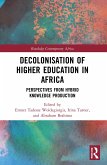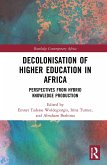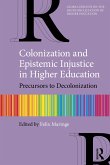Bringing a needed perspective on African Epistemologies on the critical topics of higher education in relation to knowledge systems, this book highlights how knowledge creation processes influence higher education systems, society, and African development.
This book uses an interdisciplinary approach to frame the connections between academic knowledge systems. Specifically, it seeks to answer questions on the trends in knowledge mobility, histories, and sociological dimensions in knowledge production in post-colonial Africa. The discussion explores how existing knowledge systems can better align with past and present narratives throughout African history and philosophies. The primary thought behind this book is to deconstruct the idea of a free market, the issue of corruption, racism and the neoliberalist approach to knowledge creation and transmission. Thus, it seeks to answer questions on the history and sociological dimensions of knowledge production in higher education.
The book argues that African epistemologies can be better understood by investigating present sociologies and histories shaping African higher education research. Researchers and university students in the field of sociology of education, economics of education, higher education and policy will find this book very useful.
This book uses an interdisciplinary approach to frame the connections between academic knowledge systems. Specifically, it seeks to answer questions on the trends in knowledge mobility, histories, and sociological dimensions in knowledge production in post-colonial Africa. The discussion explores how existing knowledge systems can better align with past and present narratives throughout African history and philosophies. The primary thought behind this book is to deconstruct the idea of a free market, the issue of corruption, racism and the neoliberalist approach to knowledge creation and transmission. Thus, it seeks to answer questions on the history and sociological dimensions of knowledge production in higher education.
The book argues that African epistemologies can be better understood by investigating present sociologies and histories shaping African higher education research. Researchers and university students in the field of sociology of education, economics of education, higher education and policy will find this book very useful.








